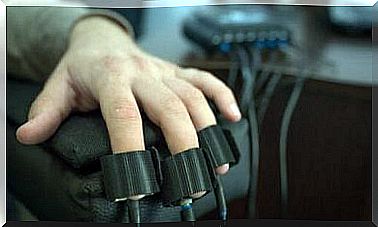Narcissism In A Relationship: Tips For Action

Contrary to what you might think, narcissists can fall in love just like anyone else. However, when there is narcissism in a relationship, the fear and anxiety can be palpable. That’s because their love is like a lasso, tightening every day. Little by little you lose your rights, your will and even your own voice.
You probably know someone who seems like a magnet for narcissists. Or maybe this is the case for you. Is there an explanation for why you can’t identify narcissists and avoid bad experiences? Some theories argue that in general, people who are more sensitive and empathetic are the ones who are attracted to narcissists.
Maybe it’s because these two personality types are mutually beneficial in some way. However, it is important to note that there is no conclusive data on this idea. After all, narcissists are charismatic and charming in the beginning. It is very easy to fall into their trap.
Narcissists often seem extraordinarily friendly and lively at first. They have a great sense of humor and are very intelligent and sure of themselves. Their outgoing charm impresses people.
That said, their true nature just lurks, beneath the surface. Narcissists are basically unable to create positive emotional bonds with other people.

Narcissism in a Relationship: Tips for Action
The way narcissism manifests itself in a relationship can vary. There are two common options. The first is when both individuals are narcissistic. The second possibility is when one person behaves clearly harmful and destructive towards the other. Let’s take a look at both possibilities.
When both persons are selfish
Before we delve deeper into this, it is important to distinguish between narcissistic behavior and narcissistic personality disorder. The latter is a clinical condition in the Diagnostic and Statistical Manual of Mental Disorders (DSM-5).
Sometimes two people with this disorder end up in romantic relationships. It’s unusual, but it can happen. Another thing that sometimes happens during the life cycle of a relationship is the following:
- You put your own needs above those of your partner.
- Maybe you need control.
- Or you fluctuate between wanting to be close to your partner and wanting distance.
So what happens when both partners are narcissistic? In fact, their union is built over an abyss, which they will sooner or later fall into.
There are couples who don’t love each other anymore, but who are still unable to end things in a healthy way. Instead of ending it, they feel apathetic, indifferent and dependent. They don’t want to let go of what once ‘was theirs’.

My partner is a narcissist, what can I do?
Usually there is only one narcissist in a relationship. So over time, the other person gets to know the true nature of his beloved. That’s when the penny drops and they begin to understand what it means to be romantically involved with a narcissist.
Keys for reflection and decision making in relationship narcissism
Livesley, Jang, Jackson and Vernon point to a study showing that 64% of cases of narcissistic personality disorder are genetic. As a result, it is not easy to change.
Also, people with this type of personality will fit somewhere on this spectrum. Some narcissists display quite abusive behavior, while others display only some narcissistic traits.
Here are some important points to remember:
- Do not doubt yourself. When you realize there is narcissism in a relationship, there are only two options: respond or learn to live with emotional abandonment. If you do the latter, you are constantly doubting yourself, your self-esteem and even your identity.
- Divorces and Reconciliations. Are they really worth it? When your partner is a narcissist, you live on a rocky path of breakups and reconciliations. You may find the strength to leave the relationship at some point. However, narcissists are very good at turning on their charm and winning you back. Think about what this means for your dignity.
- They need you to validate their self worth. But what about yours? Since narcissists do not have a central ego, they need someone else to establish and strengthen their self-image. They gain confirmation by feeding at the expense of someone else. Think about whether this is really worth it. Think about where you see yourself in 5 to 10 years.

Conclusions
The best advice we can give if your partner is a narcissist is to break up with them. However, this is a very personal decision. Saying that narcissists can’t be good partners is like saying that no one can change their personality or do anything about it.
It is best to evaluate on a case by case basis. Making sweeping generalizations is always dangerous. Not all situations are the same and not all narcissistic people are exactly the same.
There are some psychological strategies to help people with narcissistic personality disorder. One example is talk therapy. However, changing narcissism is a complex process in itself, not to mention the fact that most narcissists resist going to therapy.
Narcissism in a relationship is therefore something that requires a lot of time and energy to defend yourself and make decisions. But if you find yourself in this situation, make change a priority and take care of yourself. Prioritize your well-being and your integrity.









